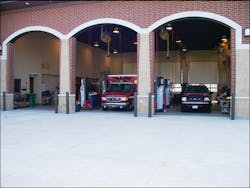One might not think much needs to be done to the body in severe service, or even the pump for that matter, but just the opposite is true.
Think about the salt and calcium chloride that your own vehicles drive through seasonally or the mud and dust your pickup encounters annually if you live in those kinds of areas.
Fire apparatus need the same care, or more, in those kinds of conditions because we don't have the option of parking them when the weather's bad, or to store them for the winter. Most apparatus are just not babied like that.
When the evitable chip or scratch occurs it ought to be covered as soon as possible to prevent corrosion, said Steve Reedy, vice president and general manager of the General Safety Division of Rosenbauer America.
And on an even more basic level, the bodies need to be washed regularly and kept clean, said Capt. Randy Covert, Fleet Manager of Eligin, Ill., Fire Department. Part of Elgin's routine is power washing at every scheduled maintenance, Covert said.
Beyond washing, Reedy said lubricating door locks, hinges and jambs goes a long way to making the bodies serviceable for the life of the apparatus.
"WD-40 is a good thing," Reedy said of the lubricating spray. He said it goes a long way for routine maintenance and lubrication for many moving parts on apparatus.
"A lot of departments have one or two discharges they use all the time, and those work fine, like the front-bumper discharge, or the officer's-side rear discharge," Reedy said. "But when it comes time to use the deck gun, it's stiff and doesn't work well. That's because it hasn't been exercised regularly.
Lubrication and exercising of moving components on pump panels can make it easier to use valves and levers that might be stiff from the cold, said John Marvin, Service Manager for the General Safety Division of Rosenbauer America.
He added there are still apparatus in service with mechanical pressure-relief valves that seldom get exercised sufficiently, and because of that, don't work as they should.
"Lots of times, someone sets the pressure-relief valve and says 'don't touch that,' " Marvin said. "But that's not the way it works. It needs to be moved to make sure it works."
The same goes for two-stage pumps, he said, noting that often departments don't test the high side and the volume side of the pump just to make sure they can get water in both modes.
"Can you get water to the other side," Marvin said, asking a rhetorical question about a department's ability to get water from the high-pressure side of the pump.
When it comes to pumps, freezing temperatures is the enemy of pumps. They must be operated with pure water in them in subzero temperatures.
Freezing can do irreparable harm to the castings of even the best and newest pumps. Central drains that remove all water from the pumps, including on the discharges and intakes, can be a good option on cold weather operations.
Reedy offered a basic operation tip for those who pump in cold weather - keep the water circulating in the pumps by moving water from the tank, through the pump and back into the tank. Simply churning the water within the pump can cause the water to boil from friction and extreme heat can damage a pump and cause mechanical failure.
Another tip offered by Rick Suche, president and owner of Fort Garry Fire Trucks, Ltd., is to place ecologically safe antifreeze in the caps of the discharges and intakes to keep the threads from freezing and making the caps difficult to remove in the cold.
Suche also said it's a good idea to have the pumps tested routinely to make sure everything is working properly.
The Elgin Fire Department's Covert has pump operation testing down pat - Covert hires Underwriters Laboratories (UL) to do annual pump testing on his fleet. "UL does it exactly the same way every year so it's easy to trend pump performance year to year," Covert said.
He added he also appreciates having the documentation and being relieved of the liability for certifying pump performance. That way when he goes to his superiors or to the City Council for money for repairs, he has third-party testing documentation to support his request for repairs or replacement.
"It makes things a lot easier when you have the documentation," Covert said.
More Articles and Podcasts From This Series
- Apparatus Maintenance: Severe Conditions Require Extra Apparatus Care
- Severe Service Maintenance: Heating, Cooling and Climate Control
- Severe Service Maintenance: Pump and Body Considerations
- Severe Service Maintenance: Undercarriage Care
- Firehouse Roundtable: Apparatus Maintenance
- Podcast: Rick Suche on Apparatus Maintenance for Severe Service
- Apparatus Makers Recommend Routine Maintenance for Safety
- Following Manufacturers’ Guides Keeps Apparatus in Top Condition
- Finding Qualified Technicians is Key to Apparatus Maintenance
- Firehouse Roundtable Apparatus Maintenance
- Podcast: Apparatus Maintenance: Bill Foster on Apparatus Safety
- Podcast: Apparatus Maintenance: Glenn Davis on Preventative Maintenance Programs
About the Author

Ed Ballam
Ed Ballam served as associate editor for Firehouse. He is the assistant chief of the Haverhill Corner, N.H. Fire Department, and a National Registered EMT. He is also a Deputy Forest Fire Warden for the New Hampshire Division of Forests and Lands. Professionally, he's been a journalist for over 35 years working for a variety of publications, including employment as managing editor of a national fire service trade journal for more than a decade.
